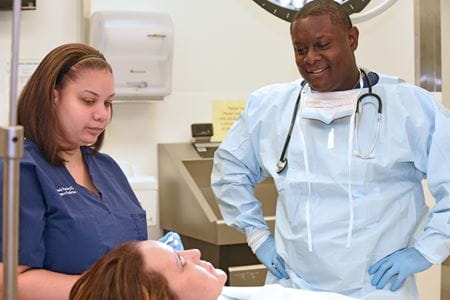As an emergency room physician, Paul Musey, MD, MSc, noticed many patients coming in with heart attack symptoms who, upon evaluation, were found to have no major heart problems. The culprit for the onslaught of symptoms? Anxiety.
Musey and other Indiana University School of Medicine researchers were in the middle of designing a study on these “low-risk chest pain” patients, which would test different levels of treatment for underlying anxiety, when they noticed something missing in their project design: cultural competence. Not only were the same patients often returning to the ER with chest pain complaints related to untreated anxiety, but the majority of these patients also happened to be members of medically underserved, minority populations.
The researchers began to ask: What role does race play in how an emergency room patient is approached? And, how does a patient’s experience with clinical staff influence their decisions on whether to participate in a clinical trial or to follow through with recommended treatment?
That’s where the Indiana University Racial Justice Research Fund came in. Jointly supported by IU’s Office of the Vice President for Research and the Office of the Vice President for Diversity, Equity and Multicultural Affairs, the start-up fund grants up to $15,000 for research by IU faculty focused on racial equity and justice.
Musey’s study, “Race as a Factor in Patient-Centered Outcomes Research on Low-Risk Chest Pain and Anxiety,” is one of 37 projects across the university system to be supported by the Racial Justice Research Fund in Fall 2020 and is one of two projects being led by IU School of Medicine researchers.

Aiming to enroll a diverse group of participants in the study, the researchers recognized some potential barriers to finding patients who would stick with the recommended course of treatment for up to 10 weeks.
“We are dealing with a population that has a unique mistrust of many institutions, especially the medical community and particularly when it comes to clinical research. You start saying ‘study’ and ‘research’ and they are immediately turned off in a way that other populations aren’t,” Musey said. “We are trying to tailor our message to the patients we are trying to help. A one-size-fits-all approach leaves out a significant number of patients who would likely be open to getting the care they need if approached correctly.”
Support from the Racial Justice Research Fund will allow researchers to conduct focus groups and fine-tune their approach, making it more culturally competent so patients who are most likely to benefit from the clinical trial will want to participate.

Jill Connors, PhD, co-principal investigator on the study and assistant research professor of surgery at IU School of Medicine, is heading up patient engagement. She has been working with seven “patient partners” for the last three years, asking them for feedback as the clinical study is being designed. The majority of these patients represent medically underserved populations.
“It’s been very enlightening. You never realize how much they bring to the table until you ask them about these things,” Connors said. “We’re discussing different aspects—about how anxiety disproportionately affects these communities and about differences in receptivity to treatments—and really looking at how to frame the benefits of the research in terms these patients will value.”
Undergirded by support from the Racial Justice Research Fund, the IU School of Medicine researchers are piloting an online, cognitive behavioral therapy program which includes study participants talking with a peer support specialist—someone who also has struggled with anxiety and learned effective coping strategies—provided in partnership with the National Alliance for Mental Illness of Greater Indianapolis.
“We will use the feedback to make the study stronger,” Musey said. Enrollment in the clinical trial is expected to begin sometime in 2021.
The goal of the study is twofold:
- To get low-acuity patients the appropriate care and treatment they need to keep them from returning to the ER with anxiety-induced symptoms.
- To inform emergency room clinicians about the impact of their patient approach when making treatment recommendations and referrals for mental health care.
“Nationally, there is a shortage of mental health professionals, and people often don’t get the help and treatment they need for anxiety,” Connors said. “There is huge potential to change the way these patients are cared for across the nation.”
